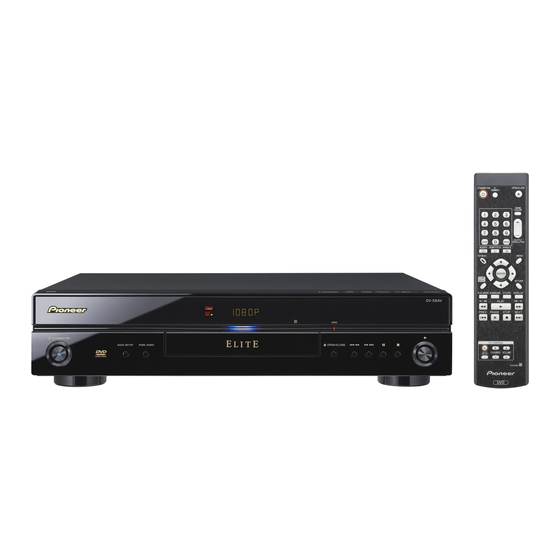Pioneer Elite DV-58AV Manuale di istruzioni per l'uso - Pagina 43
Sfoglia online o scarica il pdf Manuale di istruzioni per l'uso per Lettore DVD Pioneer Elite DV-58AV. Pioneer Elite DV-58AV 48. Pioneer dv-58av: user guide
Anche per Pioneer Elite DV-58AV: Specifiche tecniche (2 pagine), Specifiche tecniche (2 pagine)

Problem
No audio, or audio is distorted.
The analog audio is OK, but there
appears to be no digital audio
signal.
Noticeable difference in DVD and CD
volume.
Cannot play multi-channel audio.
Cannot listen to high-sampling rate
audio through the digital output.
Cannot output 192 kHz or 176.4 kHz
digital audio.
Cannot output 96 kHz or 88.2 kHz
digital audio.
DTS audio signals are not output
from the DIGITAL AUDIO OUT
(COAXIAL/OPTICAL).
Audio mix does not sound right or
sounds incomplete (for example,
inaudible dialog).
Can't hear effect of Virtual
Surround.
The power automatically turns on.
The power automatically turns off.
Your TV and AV system
automatically change inputs.
Remedy
• No audio is output during slow motion playback or when scanning discs other than Audio CDs and
SACDs.
• Some DVD discs do not output digital audio: Switch your amplifier to the player's analog outputs.
• Check that the disc is free from dust and dirt, and that it is not damaged (page 40).
• Check that all interconnects are firmly inserted.
• Check that the plugs and terminals are free of dirt, oxide, etc. and clean if necessary. Also check the
cable for damage.
• Make sure the player's output is not connected to the amplifier's phono (turntable) inputs.
• Check your amplifier/receiver's settings (volume, input function, speaker settings, etc.).
• Make sure that the Digital Out (page 32) is set to On.
• Check that the Dolby Digital Out, DTS Out and MPEG Out (page 32) are suitable for your amplifier/
receiver — check the instruction manual that came with your amplifier/receiver.
• SACDs and some DVD-Audio discs do not output digital audio. Listen through the player's analog
audio outputs.
• Check that the PURE AUDIO indicator is not lit. If it is, press the PURE AUDIO button (See also Front
panel on page 16).
• This is due to differences in the audio format and is not a malfunction.
• Make sure that Audio Output Mode (page 36) is set to 5.1 Channel.
• Check that the Dolby Digital Out, DTS Out and MPEG Out (page 32) are suitable for your amplifier/
receiver—check the instruction manual that came with your amplifier/receiver.
• DVD-Audio and SACDs do not output multichannel digital audio. Listen through the player's analog
outputs.
• Check that the settings in the Speaker Installation screen are correct (page 34).
• Check the audio options available from the disc menu.
• Make sure that Linear PCM Out (page 32) is set to Down Sample Off.
• As a copy-protection measure, some DVDs do not output 96 kHz audio. In this case, even if set to
Down Sample Off, the player automatically outputs the audio at 48 kHz. This is not a malfunction.
• The player does not output digital audio at these sampling rates. The digital output is automatically
downsampled.
• Check that Linear PCM Out (page 32) is set to Down Sample Off.
• Some discs are digital copy protected and do not output high sampling rate digital audio. In this case
the output is automatically downsampled.
• If this unit is connected to a non-DTS compatible amplifier or decoder using a digital audio cable, set
DTS Out (page 32) to DTS > PCM. If you do not do this, noise will be output when you play a DTS disc.
• If this unit is connected to a DTS-compatible amplifier or decoder using a digital audio cable, check the
amplifier settings, and that the cable is properly connected.
• Make sure that Audio Output Mode (page 36) is set to 2 Channel if you've connected to the stereo
inputs on your amplifier or TV.
• Virtual Surround does not work with SACD or DVD-Audio.
• The Virtual Surround effect is only output through the AUDIO OUT (2ch) analog audio outputs.
• Make sure that Audio Output Mode (page 36) is set to 5.1 Channel.
• The effectiveness of Virtual Surround varies with the disc.
• This unit's power may be turned on when you control this unit from a connected TV. If you do not want
this unit to be turned on in this way, set this unit's HDMI Control (page 34) to Off.
• This unit's power may be turned off when you control this unit from a connected TV. If you do not want
this unit to be turned off in this way, set this unit's HDMI Control (page 34) to Off.
• The connected TV and AV system automatically may change inputs in response to this unit starting
playback or having the GUI screen (ex. Disc Navigator) displayed. If you do not want your TV and AV
system to change inputs in this way, set this unit HDMI Control (page 34) to Off.
08
43
En
